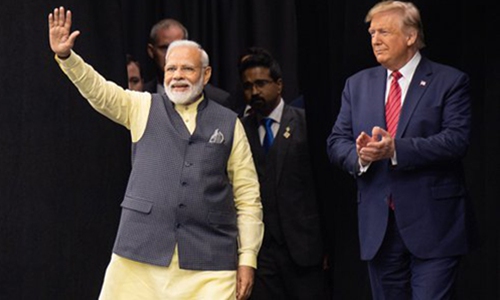India plays with fire spicing up G7 expansion
Source:Global Times Published: 2020/6/5 11:38:40

US President Donald Trump and Indian Prime Minister Narendra Modi attend "Howdy, Modi!" at NRG Stadium in Houston, Texas, September 22, 2019. Photo:VCG
Indian Prime Minister Narendra Modi responded positively to US President Donald Trump's proposal of expanding G7 into a G11 or G12 that includes India.
In a phone conversation on Tuesday, Modi commended Trump for his creative and far-sighted approach, acknowledging the fact that such an expanded forum would be in keeping with the emerging realities of the post-COVID-19 world, according to a statement by the Indian Ministry of External Affairs.
The idea of G7 expansion carries geopolitical calculations with an obvious attempt to contain China. The US is keen on roping India in not only because the latter has become the fifth-largest economy in the world, but also because India is considered an important pillar for the US' Indo-Pacific Strategy. The US has long sought to strengthen India's role as a counterbalance to China in the Indo-Pacific region.
India's positive response to Trump's plan is not surprising. With its big power ambition, India has long desired to participate in world's leading international clubs. With a fresh border spat brewing between China and India in recent days, India also hopes to send a signal to China by endorsing the US' G7 expansion idea. Many Indian strategists suggest that their country should move closer to the US in order to exert pressure on China.
Since Modi began his second term, India's attitude toward China has changed. India decided to upgrade its engagement with the Quadrilateral Strategic Dialogue, or "the Quad," between India, Australia, Japan and the US, at the ministerial level in September 2019.
During Trump's visit to India in February this year, the US and India said they would enhance their relations to the "comprehensive global strategic partnership" level. This means India has been ready to cooperate in implementing the US Indo-Pacific Strategy in exchange for US support for its pursuit to hold the status of a major power, and other plans.
Amid the backdrop of the COVID-19 pandemic, senior officials from Quad countries and three additional states - New Zealand, South Korea and Vietnam - teleconferenced in March. India played an active role in pushing this meeting. Although they claimed to be mainly aimed at dealing with COVID-19 issues, the efforts to institutionalize the Quad and the intention to expand it to Wellington, Seoul and Hanoi cannot be underestimated.
It's fair to say India has been active in many of US plans that target China. In the post-pandemic era, if the rise of China's strength and international status cannot be stopped while the US remains in a state of decline, it's very likely that India will align with the US to contain China despite it claims to maintain strategic autonomy.
India's strategic and policymaking circles are in the hands of a small group who hold ingrained negative views toward China. With China's rise and the increasing strength gap between Beijing and New Delhi, India's anxieties toward China have also increased.
India's China observers and analysts understand well that Trump's G7 expansion plan is a geopolitical calculation against China. An article in the Firstpost says, "It's a geopolitical move and a tactical maneuver. An alliance of powerful democracies is also an ideological challenge to China." But they support India to take the opportunity to play hardball with China. This has demonstrated India's strategic mentality toward China. Their judgment on the development of global strategic situations is very different from that of China. They believe Western countries still have an advantage. And that if they choose to stand with the US, they will benefit.
However, if India hastily joins a small circle that perceives China as an imaginary enemy, China-India relations will deteriorate. This is not in India's interests. The current bilateral relations have already been on a downward trend. The China-India relationship is now in a state that only top leaders can determine courses of progress. After all, the deteriorations of relations cannot simply be reversed through efforts at social levels.
The article was compiled by Global Times reporter Yu Jincui based on an interview with Liu Zongyi, secretary-general of the Research Center for China-South Asia Cooperation at Shanghai Institutes for International Studies, a visiting fellow of the Chongyang Institute for Financial Studies, Renmin University of China and a distinguished fellow of the China (Kunming) South Asia & Southeast Asia Institute. opinion@globaltimes.com.cn
Posted in: VIEWPOINT,CHINA-INDIA